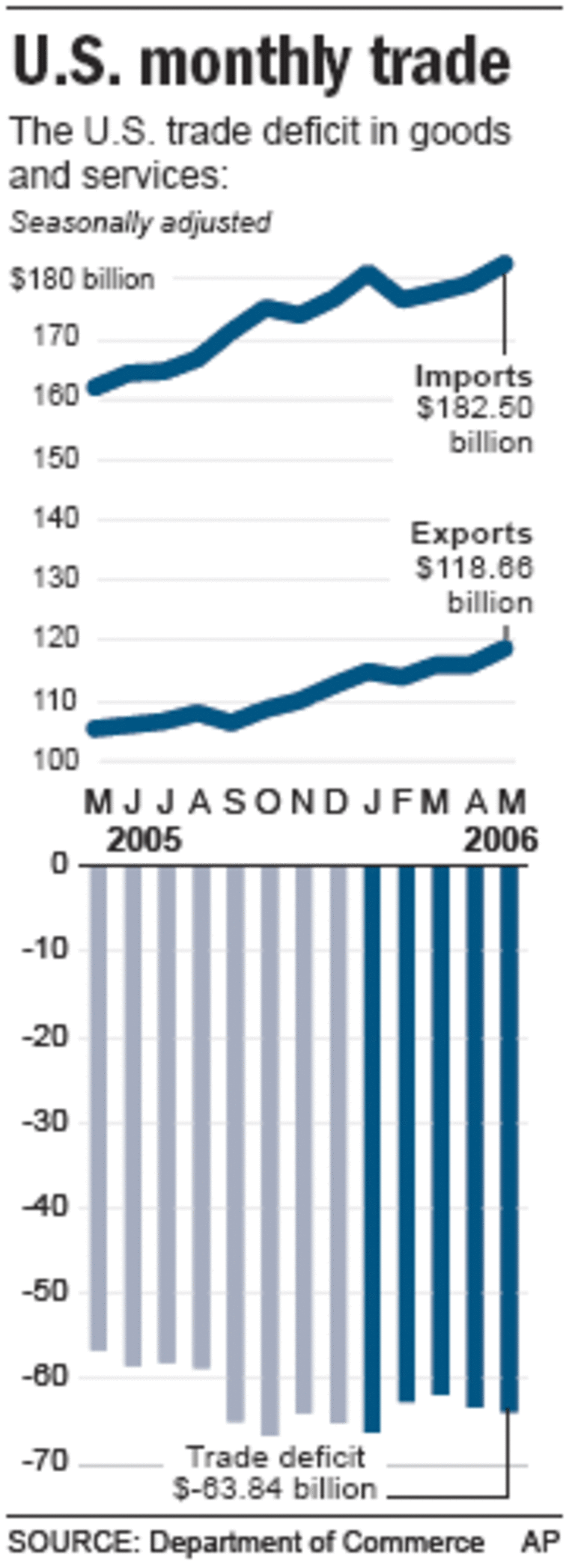A record jump in the price of imported oil pushed the trade deficit to $63.8 billion in May, offsetting robust overseas sales gains by American companies.
On Wall Street, stocks dropped sharply after a separate report showed that weekly oil inventories fell to their lowest level since early March. That raised the prospect that the U.S. will have to import even more oil.
The price of foreign oil jumped by the largest amount since the run-up to the first U.S.-Iraq war in 1990, and America’s trade imbalance rose 0.8 percent from a revised April deficit of $63.3 billion, the Commerce Department said Wednesday.
The monthly deficit was the sixth-largest ever.
“Oil is sucking us dry, and even stronger world growth cannot keep the trade deficit from widening,” said Joel Naroff, chief economist at Naroff Economic Advisors.
The trade deficit is running at an annual rate of $763 billion, 6.5 percent higher than last year’s record of $716.7 billion. President Bush’s critics blame the dwelling deficits on unfair trade practices in China and elsewhere, and say they have contributed to the loss of nearly 3 million manufacturing jobs since Bush took office.
Critics were vocal on Capitol Hill on Wednesday as Bush headed to Germany in advance of a Russian-hosted summit this weekend of the Group of Eight industrial democracies. Energy shortages and prices are expected to be among the main issues in discussions.
“Month after month, we get new evidence documenting the magnitude of the failure of current U.S. trade policies,” said Sen. Byron Dorgan, D-N.D. “Yet the Bush administration and its allies in Congress just keep doing more of the same.”

He contended that trade deals negotiated by the current administration “sink us in an ever-growing trade deficit that weakens our country economically, sends good American jobs overseas and carries with it the potential for serious economic trouble.”
The administration says it is pursuing free trade agreements as a way of boosting U.S. exports.
The increase in the May deficit reflected a 16.9 percent surge in the foreign oil bill. It totaled $27.9 billion, $4 billion more than in April.
The increase reflected a big jump in the average price of imported crude oil, to $61.74 a barrel. That was $4.92 higher than the month before. Also, it was the biggest one-month increase since oil rose by $6.06 a barrel from August to September in 1990 after Iraq’s invasion of Kuwait sent global oil prices soaring.
Economists are predicting the trade deficit will worsen, reflecting additional increases in world oil prices. They reached a record last week, above $75 a barrel.
The U.S. deficit with China rose by 4 percent to $17.7 billion, reflecting big gains in imports of cell phones, clothing and textiles, and writing and art supplies.
Both U.S. exports to other countries and imports set records in May.
The government report for May also showed that:
- Exports rose a sharp 2.4 percent, the biggest monthly gain in 17 months. The increase pushed total exports to $118.7 billion as overseas sales of American farm goods, industrial supplies and consumer goods climbed to all-time highs.
- Imports, driven higher by the oil prices, rose 1.8 percent to a record $182.5 billion.
- The U.S. deficit with Mexico rose to a record of $5.5 billion. But the deficit with Canada, America’s other partner in the North American Free Trade Agreement, declined slightly to $5.8 billion.
- The deficit with the 25-nation European Union rose to $10.8 billion; the imbalance with Japan edged down slightly to $7.1 billion.
The administration is facing increasing pressure in an election year to show progress in dealing with the trade deficit. New Treasury Secretary Henry Paulson has said he will continue to pursue efforts to get China to overhaul its currency system to allow the yuan to rise in value against the dollar.
American manufacturers contend that the yuan is undervalued by as much as 40 percent against the dollar. That makes Chinese products cheaper for U.S. consumers and makes American goods more expensive in China.
Also Wednesday, two administration officials urged lawmakers to approve quickly legislation that would establish normal U.S. trade relations with Vietnam. They said the move would open one of Asia’s fastest-growing markets to U.S. businesses and lead to an improvement in Vietnam’s protection of human rights and political and religious freedoms. The two countries had nearly $8 billion in trade last year.